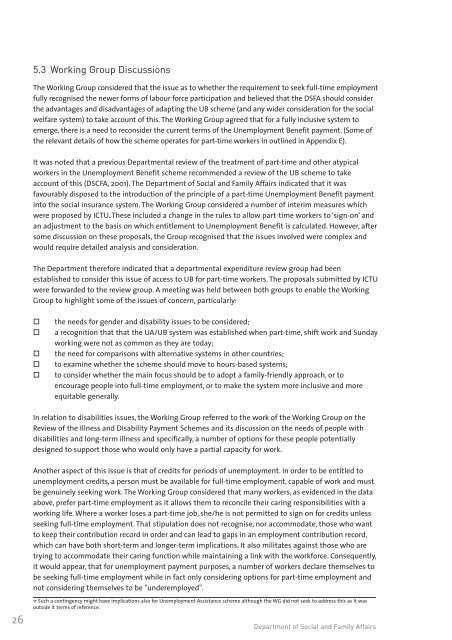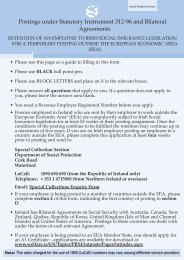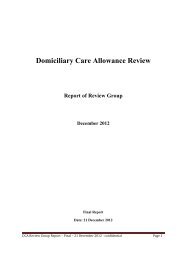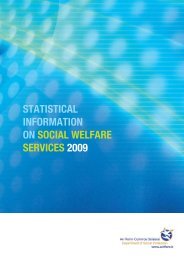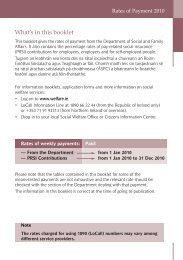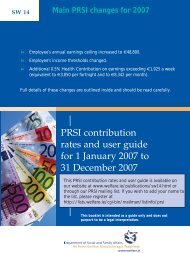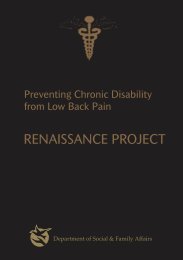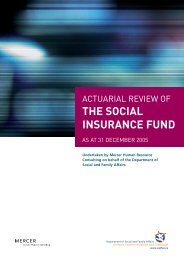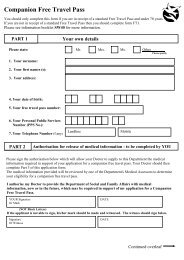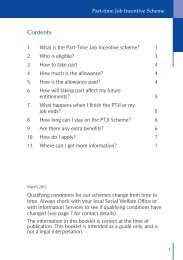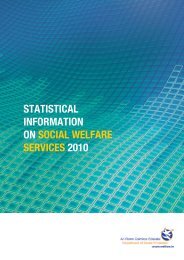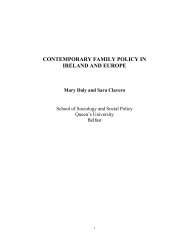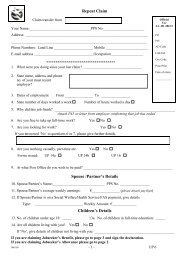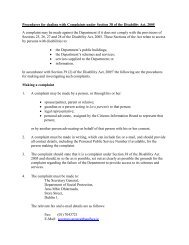Developing a Fully Inclusive Social Insurance Model - Welfare.ie
Developing a Fully Inclusive Social Insurance Model - Welfare.ie
Developing a Fully Inclusive Social Insurance Model - Welfare.ie
You also want an ePaper? Increase the reach of your titles
YUMPU automatically turns print PDFs into web optimized ePapers that Google loves.
5.3 Working Group DiscussionsThe Working Group considered that the issue as to whether the requirement to seek full-time employmentfully recognised the newer forms of labour force participation and bel<strong>ie</strong>ved that the DSFA should considerthe advantages and disadvantages of adapting the UB scheme (and any wider consideration for the socialwelfare system) to take account of this. The Working Group agreed that for a fully inclusive system toemerge, there is a need to reconsider the current terms of the Unemployment Benefit payment. (Some ofthe relevant details of how the scheme operates for part-time workers in outlined in Appendix E).It was noted that a previous Departmental rev<strong>ie</strong>w of the treatment of part-time and other atypicalworkers in the Unemployment Benefit scheme recommended a rev<strong>ie</strong>w of the UB scheme to takeaccount of this (DSCFA, 2001). The Department of <strong>Social</strong> and Family Affairs indicated that it wasfavourably disposed to the introduction of the principle of a part-time Unemployment Benefit paymentinto the social insurance system. The Working Group considered a number of interim measures whichwere proposed by ICTU. These included a change in the rules to allow part-time workers to ‘sign-on’ andan adjustment to the basis on which entitlement to Unemployment Benefit is calculated. However, aftersome discussion on these proposals, the Group recognised that the issues involved were complex andwould require detailed analysis and consideration.The Department therefore indicated that a departmental expenditure rev<strong>ie</strong>w group had beenestablished to consider this issue of access to UB for part-time workers. The proposals submitted by ICTUwere forwarded to the rev<strong>ie</strong>w group. A meeting was held between both groups to enable the WorkingGroup to highlight some of the issues of concern, particularly:" the needs for gender and disability issues to be considered;" a recognition that that the UA/UB system was established when part-time, shift work and Sundayworking were not as common as they are today;" the need for comparisons with alternative systems in other countr<strong>ie</strong>s;" to examine whether the scheme should move to hours-based systems;" to consider whether the main focus should be to adopt a family-fr<strong>ie</strong>ndly approach, or toencourage people into full-time employment, or to make the system more inclusive and moreequitable generally.In relation to disabilit<strong>ie</strong>s issues, the Working Group referred to the work of the Working Group on theRev<strong>ie</strong>w of the Illness and Disability Payment Schemes and its discussion on the needs of people withdisabilit<strong>ie</strong>s and long-term illness and specifically, a number of options for these people potentiallydesigned to support those who would only have a partial capacity for work.Another aspect of this issue is that of credits for periods of unemployment. In order to be entitled tounemployment credits, a person must be available for full-time employment, capable of work and mustbe genuinely seeking work. The Working Group considered that many workers, as evidenced in the dataabove, prefer part-time employment as it allows them to reconcile their caring responsibilit<strong>ie</strong>s with aworking life. Where a worker loses a part-time job, she/he is not permitted to sign on for credits unlessseeking full-time employment. That stipulation does not recognise, nor accommodate, those who wantto keep their contribution record in order and can lead to gaps in an employment contribution record,which can have both short-term and longer-term implications. It also militates against those who aretrying to accommodate their caring function while maintaining a link with the workforce. Consequently,it would appear, that for unemployment payment purposes, a number of workers declare themselves tobe seeking full-time employment while in fact only considering options for part-time employment andnot considering themselves to be "underemployed".2611 Such a contingency might have implications also for Unemployment Assistance scheme although the WG did not seek to address this as it wasoutside it terms of reference.Department of <strong>Social</strong> and Family Affairs


